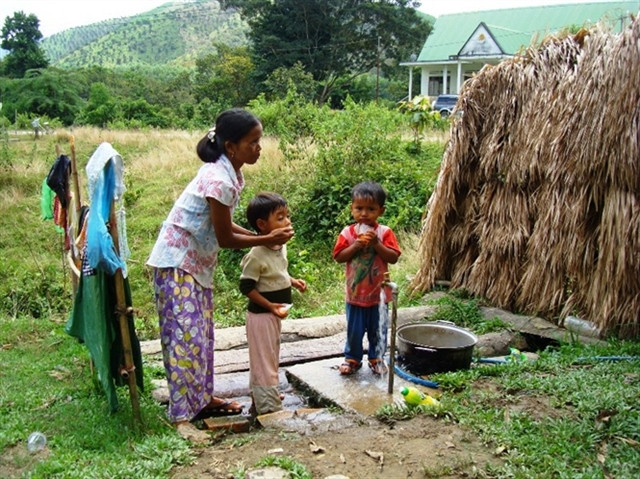 Villagers in Dam Rong district’s Ro Men commune can now access clean water. Life in the Mong ethnic minority village in the Central Highlands province of Lam Dong has changed a lot thanks to a concerted communal effort that commenced over a dozen years ago. (Photo: tintaynguyen.com)
Villagers in Dam Rong district’s Ro Men commune can now access clean water. Life in the Mong ethnic minority village in the Central Highlands province of Lam Dong has changed a lot thanks to a concerted communal effort that commenced over a dozen years ago. (Photo: tintaynguyen.com)Lam Dong (VNS/VNA) - An ethnic-minority village inthe Central Highlands province of Lam Dong has become well-known forits title “village with 3-nos” (no drinking, no smoking and no socialevils) thanks to a concerted communal effort that commenced over a dozenyears ago.
The village, home to 789 people of the Mong ethnic group, isin Dam Rong district’s Ro Men commune.
While drunkenness, smoking and social evils are rife in thecountryside, the village has set a bright example of civilised society bystopping the sale of alcohol and tobacco. This has helped eliminate scenesof drunken men and gambling.
Sung A Sang, 40, head of the village, said every Mongperson who wanted to settle there had to strictly followthe State’s laws and commit to not drinking or smoking, whileavoiding social evils.
This has achieved security and order, and no one leaves theirhouses after 9pm anymore.
When a stranger comes to visit, they must informthe head of the village even if they are only staying for one nightso the police can carry out the necessary procedures for them.If they don't, the family they are visiting must take responsibility in case any regulations are broken.
“During the Tet (Lunar New Year) holiday, localresidents participate in games such as nem con (throwing a ballthrough a ring for good luck) and badminton. There’s a lot of fun.However, people never drink wine or smoke cigarettes. They only consumesoft drinks,” Sang told Nong Thon Ngay Nay (Countryside Today)newspaper.
Giang Seo Pao, 55, a local resident, agreed.
“Everyone in the village gave up drinking and smoking becausewe are aware of its harmful effects,” he said.
Everybody knew that tobacco was harmful because it affectedboth smokers and their families in the long run, Pao said.
“It is easy for men to get drunk, but that can lead todomestic violence. That's why people decided to give up all these bad habits."
Pao said he was from the northern mountainous province of Ha Giangwhere there are only terraced fields and it was difficult for local residentsto develop a well-rounded economy. Like many other people, they volunteered togo to areas like Lam Dong, Dak Lak and Dak Nong provinces to settle down withthe hopes of a better future.
To start with back in 2004, they faced a lot of difficulties.
“We had to borrow rice seeds from residents in DaTong, another commune in Dam Rong district, and dig dong (arrowroot)bulbs in the forest. We couldn't make ends meet,” he recalled.
With hard work, a passion for learning and support fromthe Party and Government, the living standards have gradually improved.
The district authorities have poured resources into buildinginfrastructure and implemented social security polices for poor people to helpthem escape poverty.
They have also promoted restructuring crops and livestock,taking advantage of the region’s potential to boost sustainable socio-economicdevelopment.
Local authorities have strived to achieve thetarget of between 1,000-1,500 new jobs created each year, and the percentage ofpeople who have access to clean water at 93 percent.
As Pao said: “My family now has 1 hectare for coffeecultivation. I will plant durian and avocado trees on that land to boostmy income.”
What’s more important is that villagers have accessto clean water thanks to a facility which was put into operationin 2015.
In the past, they had to travel dozens of kilometres to takewater from local streams.
The improvements have led to a change in awarenessamong the community.
Knowing that the Government had invested in buildinginfrastructure for the commune, some people donated land for the constructionof a 1,500 sq.m community house, Sang said.
Local residents have also contributed land for concrete roadsbuilt with Government funding. As a result, they don’t have to walk on dirtpaths when it rains.
Their efforts have been paid off as Ro Men commune has beenrecognised as meeting the nation's new rural standards thanks to thecontributions of the Mong community./.





























